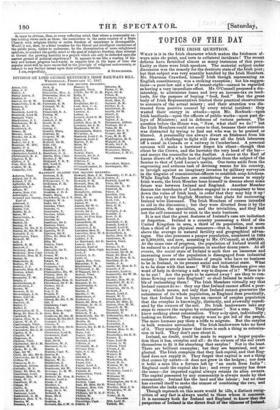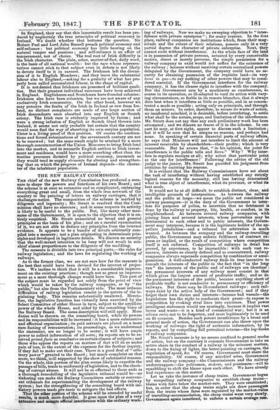TOPICS OF THE DAY
THE IRISH QUESTION.
WHAT is it in the Irish character which makes the Irishman al- ways miss the point, and turn to collateral incidents ? The recent debates have furnished almost as many instances of this pecu- liarity as there were Irish speakers. The material subject under discussion was the remedy for the destitute state of the Irish poor; but that subject was very scantily handled by the Irish Members. Mr. Sharman Crawford, himself Irish though representing an English constituency, was a striking exception; but his sugges- tions—a poor-law and a law of tenant-right--cannot be regarded as having a very immediate effect. Mr. O'Connell proposed a dic- tatorship, to administer loans and levy an income-tax on land- lords, for the purpose of buying " food, food." But the great body of Irish Representatives limited their practical observations to accounts of the actual misery ; and their attention was dis- tracted from positive counsel by every trivial incident : they wasted their energy in attacks—upon Mr. Roebuck—upon Irish landlords—upon the officers of public works—upon past de- lays of Ministers ; and in defences of various persons. The question before the House was, " Now, what, shall we do? " but the Irish Members could not come to that, because their attention was distracted by trying to find out who was to be praised or blamed. A personality can always divert an Irishman from his purpose. A challenge to fight will draw all the Irish labourers off a canal in Canada or a railway in Cumberland. A personal sarcasm will make a barrister forget his client—though that client be the Crown, and the barrister the very head of the bar— and merge the counseller in the duellist. A sneer at the Earl of Lucan draws off a whole host of legislators from the subject of the famine to that of Lord Lucan's merits. One turns aside from the engrossing and arduous task of devising rescue for his country, to inveigh against an imaginary invasion by military surveyors in the disguise of commissariat-officers to establish soup-kitchens. While English Members are considering the means to supply Irish wants, the Irish Member loses himself in dreams about some future war between Ireland and England. Another Member fancies the merchants of London engaged in a conspiracy to beat down the value of Irish land, in order that they may buy it up ! It was only by the English Members that plans for succouring Ireland were discussed. The Irish Members of course intended to aid in the discussion • but they were diverted from it by the personalities, the specilties and the trivialities, and they had not the self-command to stick to the main business.
It is not that the great features of Ireland's case are indistinct or forgotten. Ireland is a country- possessing a third of the United Kingdom in area, a third of its population, and more than a third of its physical resources—that is, Ireland is much above the average in natural fertility and geographical advan- tages. She also possesses a pauper population, numbered in 1834 at 2,300,000, and now, according to Mr. O'Connell, at 4,000,000. At the same rate of progress, the population of Ireland would all be reduced to a state of pauperism in another dozen years. At all events, the social state of Ireland is such that an immense and increasing mass of the population is disengaged from industrial society : there are some millions of people who have no business to be in Ireland, in its present social and industrial state. What is to be done with that mass ? Will the Irish Members give one word of help in devising a safe way to dispose of it ? Where is it to be put ? Are the people to be carried away ! are they to con- tinue flowing over into England ? or shall Ireland be made capa- ble of reabsorbing them ? The Irish Members virtually say that Ireland cannot do so : they say that Ireland cannot afford a poor- law ; which means, not only that Ireland cannot guarantee the subsistence of its Whole population, as England does practically, but that Ireland has so large an amount of surplus population that the overplus is knowingly, distinctly, and avowedly repudi- ated by the owners of the soil. Do Irish landowners take any steps to remove the surplus by colonization ? Not a step. They know nothing about colonization. They only eject, individually ; looking no further. They simply want to get rid of the people. The more humane pay them a trifle to migrate. But the surplus in bulk remains untouched. The Irish landowners take no heed of it. They scarcely know that there is such a thing as coloniza- tion in bulk. They don't care about it. Ireland, no doubt, could be made to support a larger popula- tion than it has, overplus and all : do the owners of the soil exert themselves to fit it for absorbing that surplus Not in the least. There are brilliant examples; but they are bepraised, and ne- glected. The Irish complain that they lack capital, and that Eng- land does not supply it. They forget 'that capital is not a thing that comes by nature—it does not grow in the hedges ; nor does it befal a man like a fortune left by "an uncle from India" : England made the capital she has ; and every country has done the same—for imported capital always retains its alien owners. The capital possessed by any community is always made by that community. Ireland has the land and the labour ; but no class has exerted itself to make the utmost of combining the two, and therefore she lacks capital. Though reproach on this score would be idle, a distinct recog- nition of any fact is always useful to those whom it concerns. It is necessary both for Ireland and England to know that the pauperism of Ireland is the direct fruit of the idleness of Ireland. In England, they say that this lamentable result has been pro- duced by neglecting the true principles of political economy in Ireland. Nye doubt whether that bottoms the question. Sir Robert Peel and Lord John Russell preach political economy and self-reliance : but political economy has little bearing on the natural temper and passions ; and self-reliance is an affair of temperament, not of choice. The real root of Irish difficulty is the Irish character. The plain, sober, matter-of-fact, daily work, is the basis of all national wealth : but the race whose represen- tatives cannot stick to that subject even in debate is not likely to devote itself to it in earnest. The Irishmen left the discus. sion of it to English Members; and they leave the substantial labour also to England,—asking for a .gratuity of what has pro- perly been called accumulated labour, in the shape of capital.
It is not denied that Irishmen are possessed of brilliant quali- ties. But their greatest individual successes have been achieved in England. Englishmen and Scotchmen have founded colonies: Irishmen also have been colonists, but we are not aware of any exclusively Irish community. On the other hand, however we may perceive the faults of the Irish in Ireland or raw from Ire- land, no distinct complaints are made of any large section of Irish descendants once absorbed into any English or Scotch colony. The Irish race is evidently improved by fusion ; and were a strong infusion of English or Scotch blood thrown into Ireland, it seems not only probable but certain that the country would soon find the way of absorbing its own surplus population. Ulster is a living proof of that position. Of course the confisca- tions and forced colonizations of the seventeenth century are not to be renewed ; but the same result might be attained by a more thorough consummation of the Union. Measures to bring Irish land into the market, and to reconcile English settlers to Irish invest- ment and residence, would have a more searching effect than the routine processes dictated by political economy, inasmuch as they would tend to supply elements for altering and strengthen- ing that on which the progress of Ireland depends—the charac- ter of the inhabitant population.



























 Previous page
Previous page